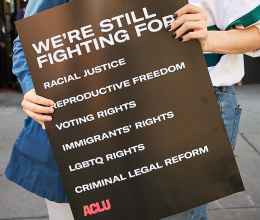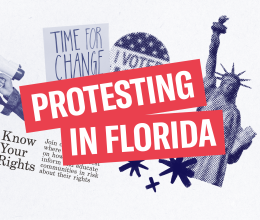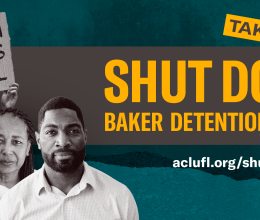
The coalition of civil rights groups is currently challenging last year’s “STOP W.O.K.E.” censorship law
TALLAHASSEE, FL – The Senate Fiscal Policy Committee voted yesterday to pass Senate Bill 266 (SB 266), which would enact draconian restrictions on academic freedom and chill speech on college and university campuses. The bill undermines tenure and puts critical faculty decisions, including hiring and retention, in the hands of political appointees. It also prohibits university spending on activities, speakers, events, and clubs that promote diversity, equity, and inclusion, threatening groups like historically Black sororities and fraternities and their ability to engage in activities and programming related to diversity, racism, oppression, and sexism.
The House Education and Employment Committee voted on Wednesday to pass the companion bill, House Bill 999 (HB 999). These bills could go to floor votes in their respective chambers as early as next week.
The bills target academic freedom in higher education one year after the passage of the unconstitutional “Stop W.O.K.E” censorship law, which was blocked by a federal court in November 2022 following a lawsuit filed by the American Civil Liberties Union (ACLU), ACLU of Florida, the Legal Defense Fund (LDF), and Ballard Spahr on behalf of seven educators and one student.
Katie Blakenship, deputy legal director at the ACLU of Florida, responded with the following:
“These bills target academic freedom in higher education, despite the fact that last year’s censorship law was blocked by a federal court in November and remains blocked to this day. They are intentionally harmful and attempt to erase the history and lived experiences of Americans of color, especially those who fought and continue to fight for equality. The bills will cause confusion and chill free speech, and their lasting effects would harm Floridians for generations. Furthermore, Black college students must now wonder if their historical societies, which played critical roles in the fight for civil rights and continue to serve as spaces that create community and cultural integration, will be targeted and whether their mission and activities promoting diversity and inclusion will be stifled. Every student deserves to learn in an environment free from government censorship. Every educator deserves the opportunity to do their job free from fear. A free society doesn’t limit what people can teach and learn in their institutions of higher education.”
Leah Watson, senior staff attorney with the American Civil Liberties Union Racial Justice Program, shared the following:
"These bills further the state of Florida’s ongoing attempts to eliminate discussions of systemic racism, sexism, oppression, and privilege from university programs and activities to undermine progress toward racial justice. Contrary to decades of research, the Stop W.O.K.E. Act censored higher education faculty from instruction that would teach students about the existence and current manifestations of these concepts. Now, the legislature seeks to erase them from campus life more broadly by prohibiting spending on any programs or activities that advocate for diversity, equity, and inclusion (DEI). This attack on DEI will remove important support for students of color, erase their heritage from campuses and classrooms, and ultimately lead to increased racial bias.”
Charles McLaurin, senior counsel at the Legal Defense Fund (LDF), responded with the following:
“This expansion of Florida’s Stop W.O.K.E. Act, which only serves to put the state’s education system at the mercy of political players, dangerously threatens educators’ and students’ abilities to teach and learn about their country’s history, and its impact on the present, both truthfully and accurately. We must be clear that this proposed legislation would only serve to harm the quality of higher education in the state—especially for Black students, other students of color, and LGBTQ+ students whose histories, voices, and lived experiences would be willfully erased. Furthermore, this bill threatens the state’s ability to maintain a racially diverse student and teaching body, including Black professors, who are already severely underrepresented in academia. All educators and students in Florida classrooms and on college campuses are entitled to high-quality, accurate learning.”







